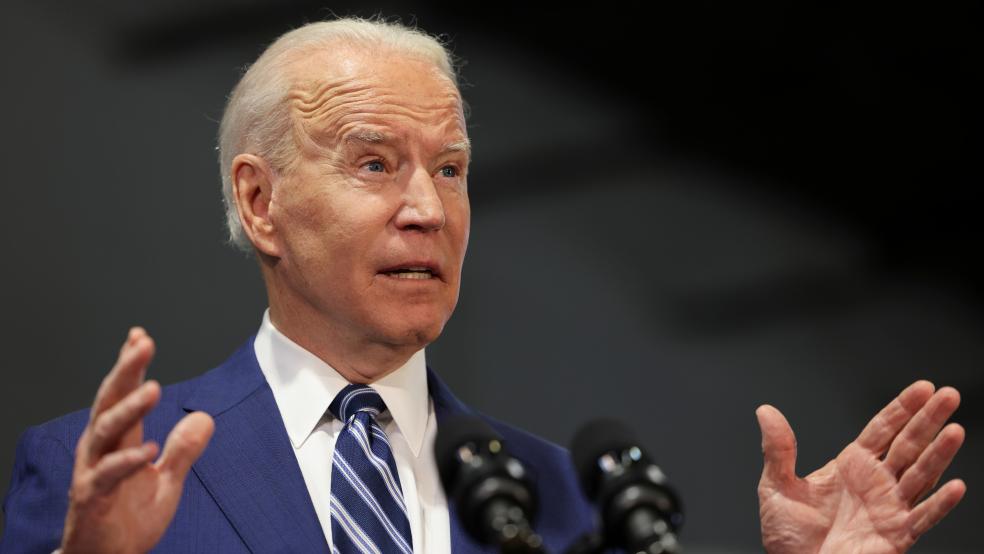This really, finally, could be infrastructure week on Capitol Hill. Or not. The bipartisan group of 21 senators hammering out an infrastructure deal is reportedly hoping to finalize its plan this week. A four-page outline of the proposal is reportedly circulating. But the roughly $1 trillion plan, including $579 billion in new spending, is still being tweaked, with senators reportedly set to meet again Monday night.
"We're continuing to work and flesh it out," said Sen. Susan Collins (R-ME), according to Politico. "There's a sense of growing optimism, that perhaps we can show our country and the world that we can come together on something that makes a real difference in people's lives."
Some details of the bipartisan deal: Politico reports that, as of now, the bipartisan blueprint includes “$360 billion for roads, bridges and major projects; $48.5 billion for public transit; $66 billion for rail; $55 billion for water infrastructure; $65 billion for broadband and $73 billion for power infrastructure. In addition, the group is proposing spending $47.2 billion on climate resiliency, $25 billion for airports, $10 billion on electric buses and $16 billion for ports.” Of the $360 billion for road and bridges, $110 billion would be new spending.
Pay-fors still a problem: As is always the case with infrastructure proposals, though, any optimism is clouded by questions about how to pay for new spending. “We’re making progress, particularly on key investments that we need to build out our nation’s infrastructure and prepare for the clean energy economy that is coming,” National Economic Council Director Brian Deese told CNN on Monday. “We still have some sticking points, particularly around how we pay for this.”
White House Press Secretary Jen Psaki told “CBS This Morning” that the administration still needs to see “a few more details” about the plan, “including specifics about how to pay for it.” She added that Biden would not accept an increase in the gas tax, which the White House says would violate Biden’s pledge not to raise taxes on people making less than $400,000 a year. “We’re just not going to stand for that and we’re not going to accept that,” she said.
The White House has also opposed proposals to re-purpose unspent Covid-19 relief funds and a fee on electric vehicles.
Psaki said that Biden would probably be speaking with and hosting some lawmakers at the White House over the next couple of days. At the same time, administration officials emphasized that Biden, while open to continuing discussions about the bipartisan deal, was also pursuing other paths to an infrastructure package.
Congressional Democrats are pressing ahead with a broader package that could be passed by the special budget reconciliation package, meaning it would not necessarily require Republican votes. That package may total as much as $6 trillion, including Biden’s plans for child care, elder care and education, along with a reduction in the Medicare eligibility age to 60 and an expansion of the health care program’s benefits to include vision, hearing and dental services (see more on this below). But getting the necessary Democratic votes to pass such a package will likely be complicated as well.
The bottom line: Sen. Lindsey Graham (R-SC) said Sunday that a $1 trillion infrastructure deal is “there for the taking,” but the issue of pay-fors could scuttle any deal. Sen. Shelley Moore Capito (R-WV), who negotiated over a separate infrastructure deal with Biden, said Monday that Biden ”really wants the bipartisan deal” but suggested that financing any package will remain a problem. “Pay-fors will be the big issue. As it was with me,” Capito said, according to Politico. And the congressional July 4 recess is rapidly approaching, leaving little time for a compromise to be reached.
Isaac Boltansky, director of policy research at investment bank Compass Point, isn’t buying the optimism: “The bipartisan effort will drive headlines in Washington this week,” he said, according to Politico, “but we remain bearish given the lack of detail, progressive reticence, and persistent divides over both scale and scope.”





